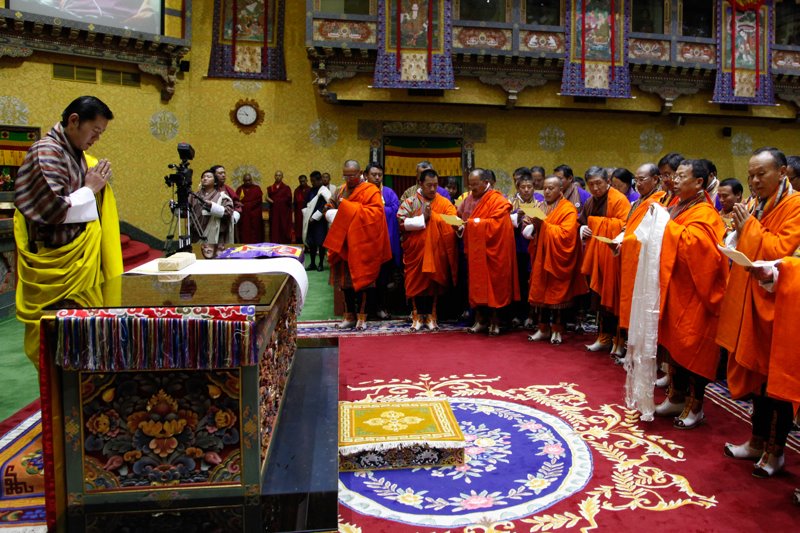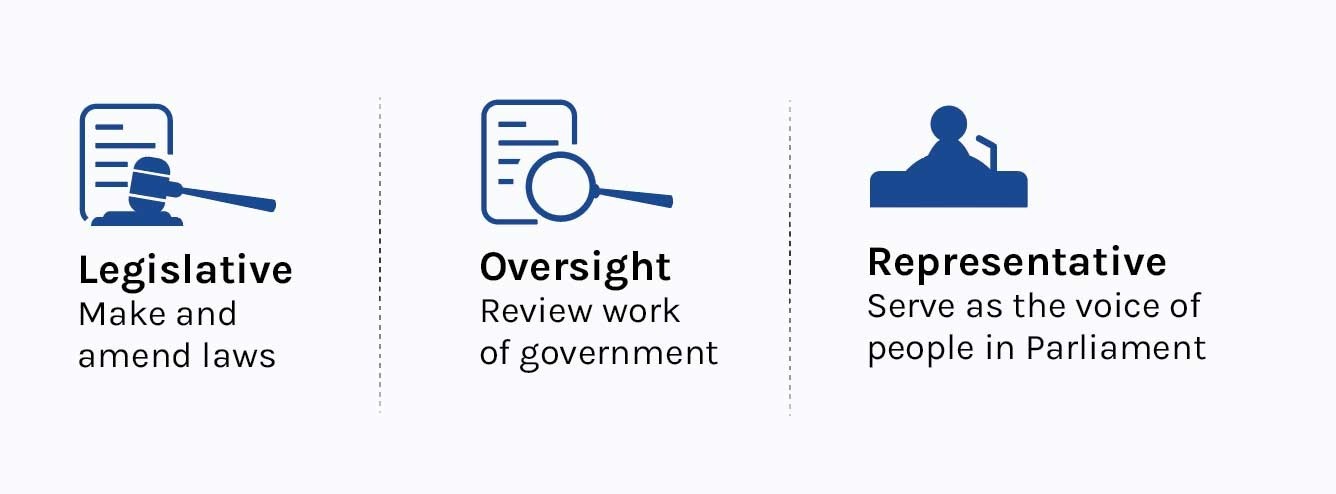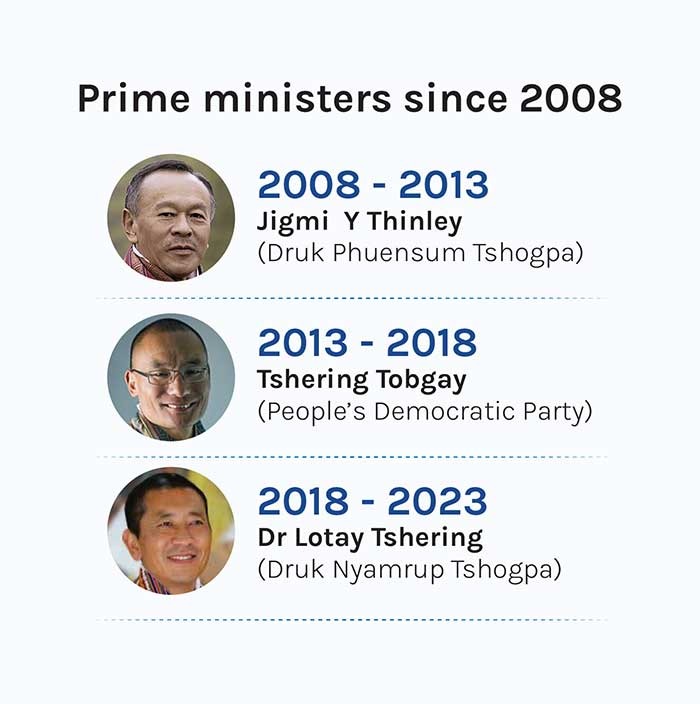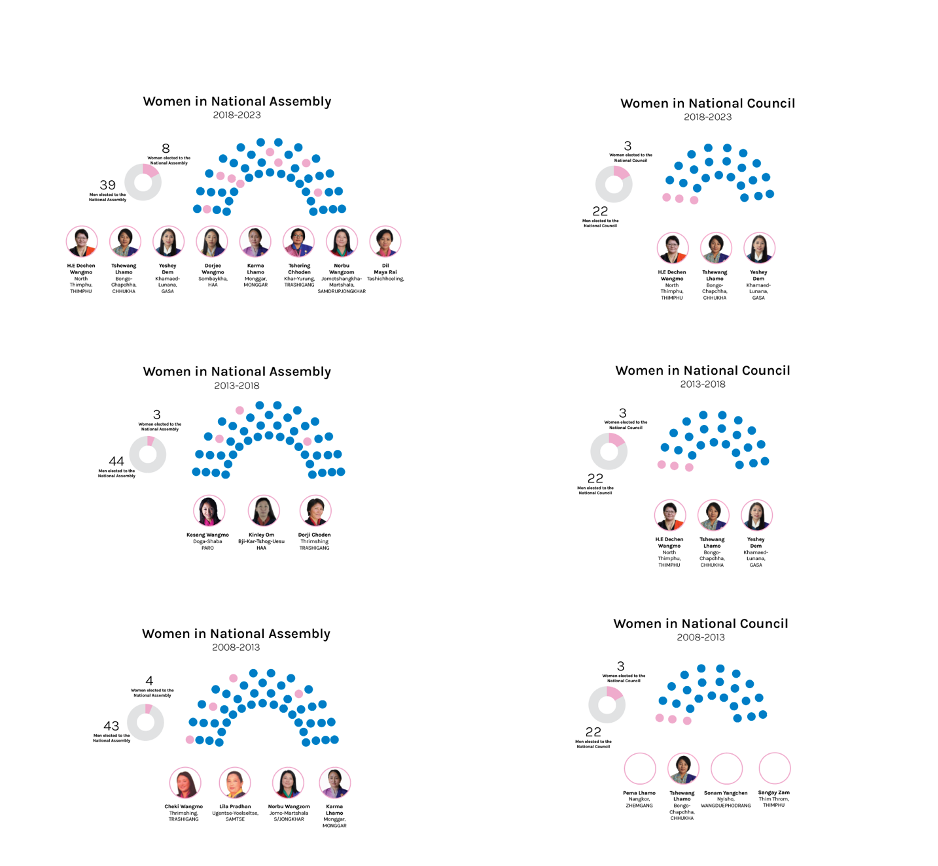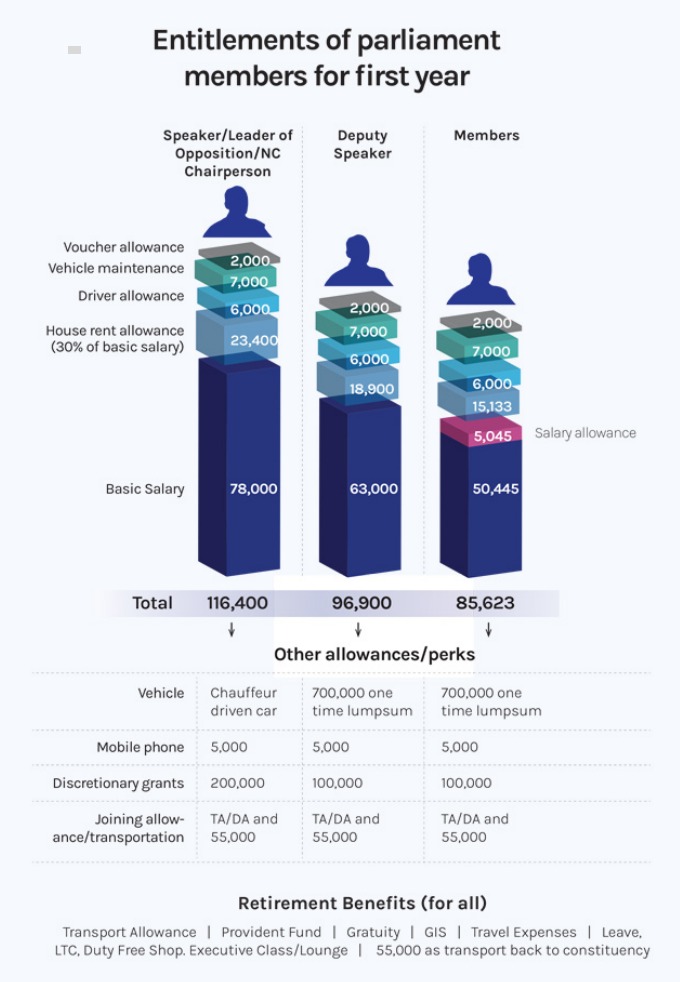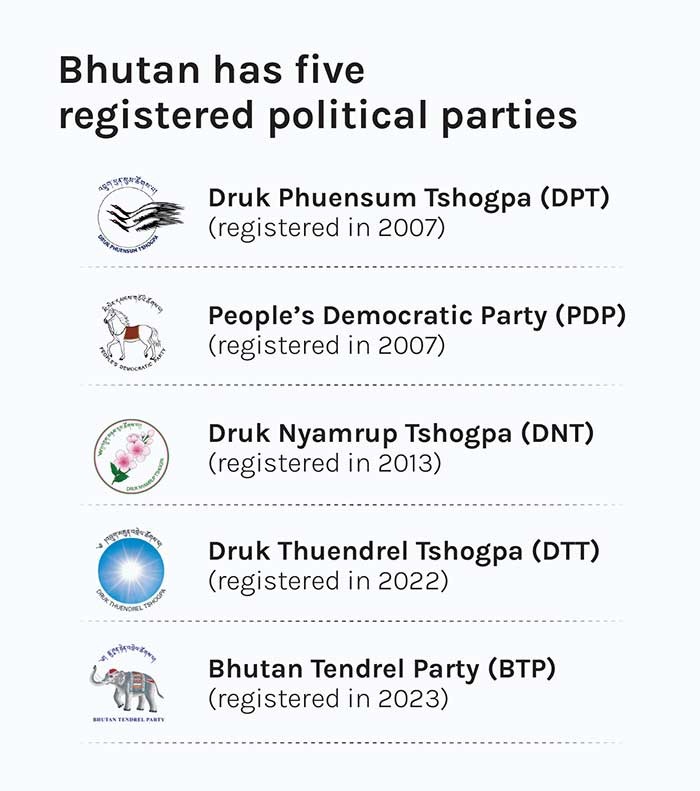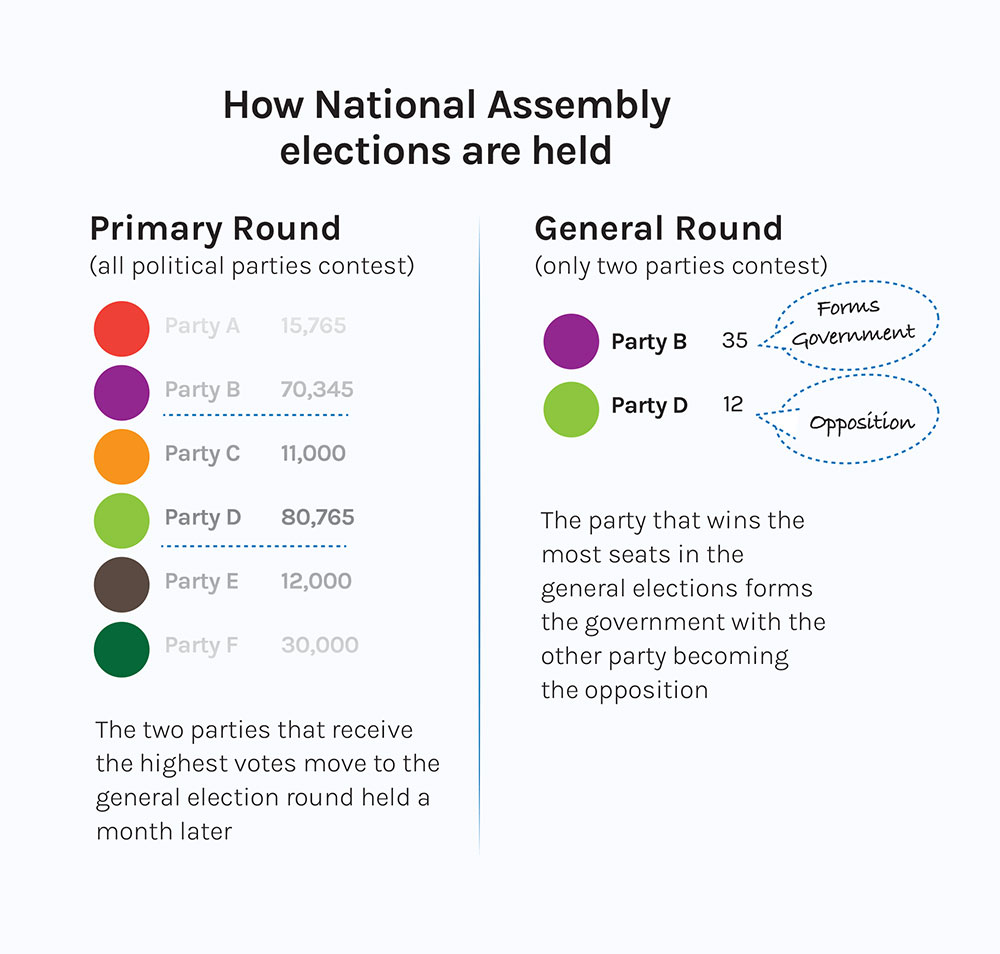About Parliament2
Formation & Composition
The current structure of parliament with two chambers was established in 2008 under Article 11 and 12 of the Constitution of Bhutan, 2008. It replaced the earlier National Assembly of Bhutan (Tshogdu), a unicameral system, established in 1953. Bhutan’s parliament, consists of the Druk Gyalpo (His Majesty), the National Council and the National Assembly.
The National Council has 25 members with one member elected from each dzongkhag (district) and five appointed by the Druk Gyalpo. National Council members do not belong to any political party. Besides legislative functions, the National Council acts as the House of review on matters that need to be brought to the notice of the Druk Gyalpo, the Prime Minister and the National Assembly.
The National Assembly has 47 members elected from each of the country’s 47 constituencies or electoral areas. The members belong to either the ruling or opposition political parties. Political parties are mandated to ensure that national interests prevail over all other interests and provide choices based on the values and aspirations of the people.
Druk Gyalpo & Parliament
The Druk Gyalpo summons the first sitting of Parliament after each general election and thereafter attends the opening and closing sessions of each sitting of Parliament.
According to the Constitution, the Druk Gyalpo may address or sit in the proceedings of either house or a joint sitting of Parliament and may send messages to either or both houses if deemed necessary. A Bill passed by Parliament comes into force upon Assent of the Druk Gyalpo.
Functions
Parliament has legislative, oversight, and representational mandates. As legislators, members debate to make new laws and amend existing ones and vote to pass laws. Members can also propose new laws.
In exercising oversight, Parliament reviews the work of government in running the country. Government ministers answer questions, respond to issues raised and keep parliament informed of any important decisions.
Elected members represent the people by serving as their voice in parliament when laws and policies are formed. They also inform citizens of their work, decisions of parliament and of government programmes.
Sittings
Parliament meets or sits at least twice a year in the capital, Thimphu, where parliament is located, but can convene an extraordinary sitting if commanded by the Druk Gyalpo. Each sitting of Parliament commences and closes with the Druk Gyalpo being received by members of both houses and takes place in the National Assembly Hall.
For both houses, at least two thirds of members must be present for a session to take place. Each sitting normally lasts for a month, however, the duration depends on the agenda. The sessions begin at 10 in the morning and adjourn at 1:30 pm. All proceedings are conducted in Dzongkha, the national language, and in public. There can be closed door sessions if there is a compelling need.
Joint sessions take place when there is a dispute over a proposed law from either of the houses. The Speaker of the National Assembly presides over the joint sitting, which is held in the National Assembly Hall. Disputes are usually resolved by appointing a committee comprising members of both houses and a final vote taken during the joint session.
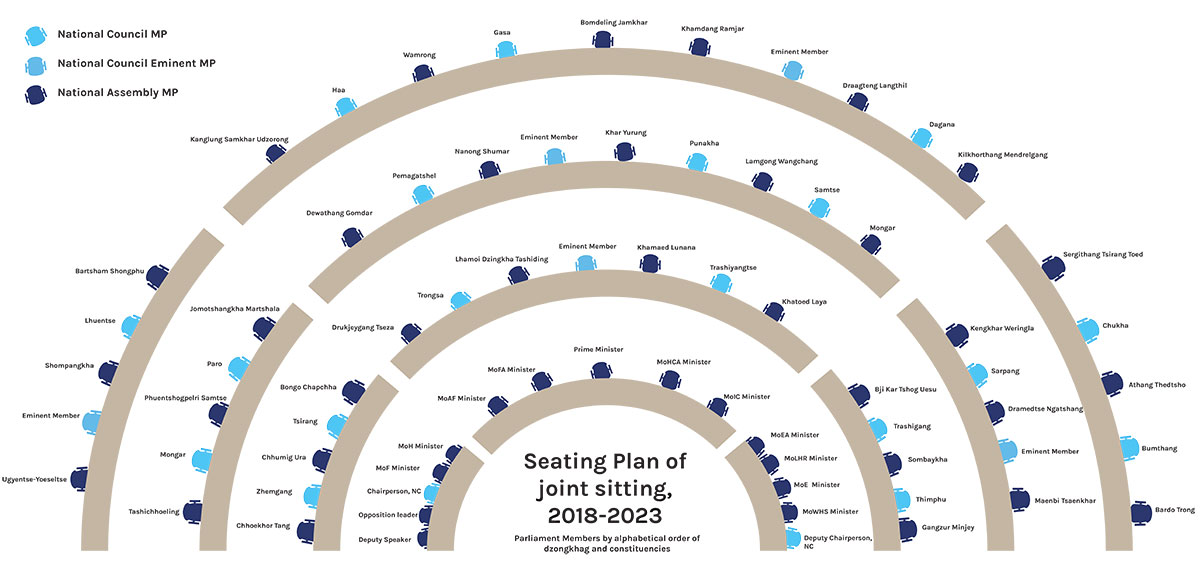
Committees
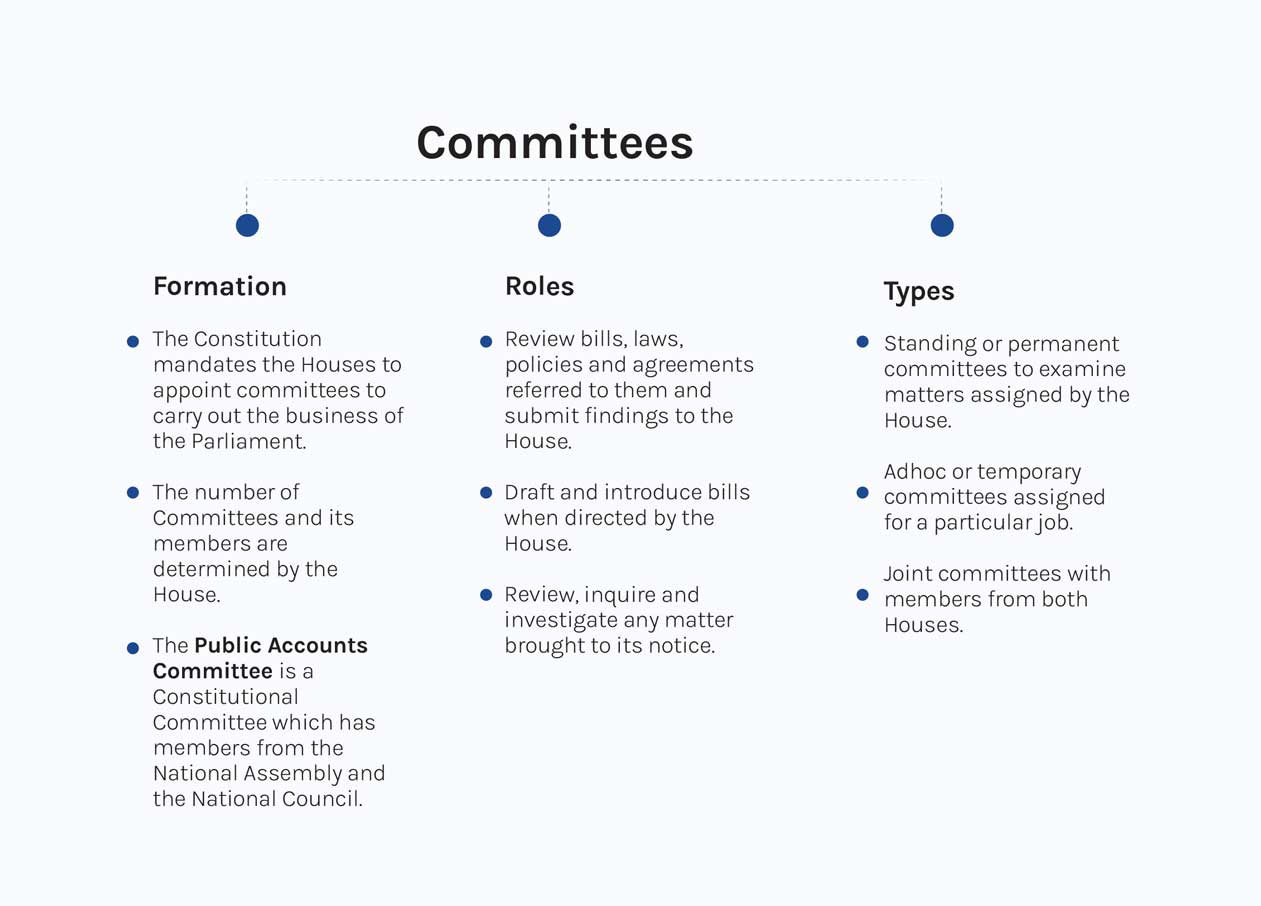
Committees conduct hearings and public consultations, seek advice from experts and provide a forum for the public to have their say on issues being discussed in Parliament. Committees report their findings to Parliament. There are three types of committees: Standing or permanent committees to examine matters assigned by the house; ad hoc or temporary committees assigned for a particular job; and joint committees with members from both houses.
Both houses have a rule of procedure in the appointment of members to committees. The Public Accounts Committee (PAC) is the only Joint standing Committee with members from both houses and reviews how public money and resources have been used by the government based on the annual audit report of the Royal Audit Authority. Click here to see list of current committees and its members.
Government
The government consists of people responsible for running the country. This includes the prime minister and cabinet ministers, who are members of parliament, and supported by civil servants.
The political party that wins most seats in the National Assembly takes charge of the government for five years, until the next election. The government implements the decisions of parliament on where to spend public money and decides how best to deliver public services. Since 2008, Bhutan has seen three different political parties form the government.
Opposition
The political party with the least number of seats in the National Assembly after the general election becomes the opposition. The leader of the opposition takes a lead role in scrutinizing the government's actions in parliament. The Opposition Party must ensure the (executive) government and the ruling party function in accordance with the provisions of this Constitution, provide good governance and strive to promote the national interest and fulfil the aspirations of the people.
Dorji Wangdi, president of the Druk Phuensum Tshogpa (DPT), is the current Opposition leader.
Women in Parliament
Women representation in Bhutan's third and current parliament is around 15 percent, the highest since transitioning to a parliamentary system in 2008. But it is lower than most countries in the South Asia region and lower than the global average of 22 percent. Although legislation provides equal rights and opportunities irrespective of gender, deep rooted socio-cultural norms continue to be the biggest barriers to women rising to leadership and decision-making positions.
Bhutan's first woman parliamentarian emerged in 1979 when the people of Chengmari, Samtse, elected Hiran Maya as their representative (chimi) to the erstwhile National Assembly, the unicameral parliament of Bhutan. She served for six years attending 12 Assembly sessions.
Salaries & Entitlements
As determined by parliament, the Speaker of the National Assembly, the Chairperson of National Council and the Opposition leader receive salaries and perks equal to that of a cabinet minister. The deputy speaker of the National Assembly and the deputy speaker of the National Council receive a salary that is 14 percent higher than that of other members. The monthly basic salary of a member is fixed at the beginning of their five-year term in office.
A parliament member is entitled to a number of allowances. These include a 30 percent house rent allowance of basic salary, a monthly vehicle maintenance allowance and driver allowance, a mobile phone and a monthly mobile phone voucher, and an annual discretionary allowance.
While the Speaker of the National Assembly, the Chairperson of National Council and the Opposition leader are entitled to a chauffeur driven car the other members are entitled to a one-time lumpsum amount to purchase a tax-free vehicle.
Members are also entitled to transport charges when moving from their constituency to the capital and daily subsistence allowance when travelling inside and outside the country. Members are entitled to use executive lounges at the airport and fly in executive class, and retirement benefits on completion of term. For a full list of entitlements, click here.
Political Parties in Parliament
Bhutan has five registered political parties Druk Phuensum Tshokpa (DPT), People's Democratic Party (PDP), Druk Nyamrup Tshogpa (DNT), Druk Thuendrel Tshogpa (DTT), and Bhutan Tendrel Party (BTP). The DNT and DPT are currently in Parliament as the ruling and opposition in the National Assembly. The National Assembly elections are held in two rounds. In the first or primary round, all political parties contest, and the two parties that receive the highest votes move to the general election round held a month later. The party that wins the majority of seats in the National Assembly forms the government with the other party becoming the opposition.
 English
English
 རྫོང་ཁ
རྫོང་ཁ


